Accelerated universities: European and Asian experience
- Authors: Vodopianova E.V.1
-
Affiliations:
- Institute of Europe Russian Academy of Sciences
- Issue: No 3 (117) (2023)
- Pages: 107-117
- Section: Articles
- URL: https://rjmseer.com/0201-7083/article/view/652242
- DOI: https://doi.org/10.31857/S0201708323030099
- EDN: https://elibrary.ru/BSOZXO
- ID: 652242
Cite item
Abstract
Using socio-cultural methodology, as well as comparative analysis and data from the most authoritative agencies in the field of global university rankings, the article scrutinises examples of the successful creation of some newly founded universities in Europe, Asia and Russia. The main purpose of the study is, firstly, to outline the socio-cultural background, and, secondly, to compare the features of the entry of relatively recently emerged universities among the world leaders. The article reveals that along with the traditional resource sources of university efficiency, such socio-cultural dominant idea of modernity as the ubiquitous “acceleration of time“ characteristic of the global era of the knowledge economy begins to play an equally important role in achieving the latter. It is established that young universities appear as an up-to-date version of the response to the challenges of modern culture as a marker of acceleration of social time. Accelerated university is defined as a university that has reached a world-class level in several decades, often with uncertain future prospects. It is argued that of all the examples considered in the article, it is the University of Skoltech that currently proves to be almost completely confirming this definition. The evolution of a young university is considered as the result of a risky innovation, the success of which is not a foregone conclusion, and is also subject to constant changes.
About the authors
Elena Viktorovna Vodopianova
Institute of Europe Russian Academy of Sciences
Email: veritas-41@yandex.ru
Moscow, Russia
References
- Альтбах Ф., Райсберг Л., Салми Дж., Фрумин И. (ред.) (2022) Ускоренные университеты: соединение идей и денег для достижения академического совершенства. Изд. Дом Высшей школы экономики, М.: 351 с.
- Водопьянова Е.В. (2012) О Сколково и не только о нем. Свободная мысль. № 3/4. С. 60-74.
- Гайгер Р. (2018) Знания и деньги. Исследовательские университеты и парадокс рынка. Изд. Дом Высшей школы экономики, М.: 408 с.
- Салми Д. (2009) Создание университетов мирового класса. Весь мир, М.: 132 с.
- Трофимова И.Н. (2022) Национальные исследовательские университеты: статус и результаты деятельности. Социология науки и техники. Т. 13. № 1. С. 116-129.
- Bertman S. (1998) Hyperculture: the human cost of speed. Praeger, Westport, USA. 288 p.
- Han B. (2022) Hyperculture: Culture and Globalization. Polity, Cambridge, UK. 106 p.
- Hrabovski F.A., Rous R.J., Henderson P.H. (2019) The Empowered University: shared leadership, culture change and academic success. John Hopkins University Press, Baltimore, USA. 320 p.
- Raposo M., Paço A. (2011) Entrepreneurship education: Relationship between education and entrepreneurial activity. Psicothema. Vol. 23. No. 3. P. 453-457. URL: http://www.psicothema.com/pdf/3909.pdf
- Redhead S. (2004) Paul Virilio: Theorist for an Accelerated Culture. University of Toronto Press, Toromto, Canada. 168 p.
- Rosa H. (2015) Social acceleration: A new theory of Modernity. Columbia University Press, N.Y., USA. 512 p.
- Warf B. (2008) Time-Space Compression. Historical geographies. Routledge, London, UK. 272 p.
Supplementary files











